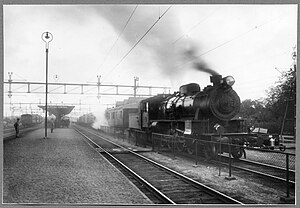HNJ Mb
| HNJ Mb | |||||||||||||||||||||||||||||
|---|---|---|---|---|---|---|---|---|---|---|---|---|---|---|---|---|---|---|---|---|---|---|---|---|---|---|---|---|---|
 G12 no:43 leaving Halmstad Station in 1931 | |||||||||||||||||||||||||||||
| |||||||||||||||||||||||||||||
| |||||||||||||||||||||||||||||
| |||||||||||||||||||||||||||||
| |||||||||||||||||||||||||||||
| References:[1] | |||||||||||||||||||||||||||||
The Mb, later G12 class of Halmstad–Nässjö Järnväg (HNJ), known after nationalization in 1945 as the E9 class of the Swedish State Railways (SJ), was a type of steam locomotive built primarily for freight traffic. They were the basis for the nearly identical SJ E10 class.
History
[edit]Three Mb class three-cylinder 4-8-0 locomotives were built by NOHAB for HNJ in 1931, based on an older type, the 2-8-0 M class built in Germany in 1922.[1][2] HNJ changed their type designations the year after, and the Mb class became the G12 class, where G meant that they were intended for freight trains (Swedish: godståg).[2] Three more G12 class locomotives were built in 1936.[1]
Despite their designation the locomotives were also used in passenger trains.[3] They remained on the HNJ network after nationalization in 1945, but were also used on the line between Alvesta and Borås.[1] SJ referred to the type as the E9 class.[3] They were in service until 1959, and were then placed in reserve.[1] They were scrapped between 1974 and 1976, and none have been preserved.[2]
In the 1940s the Swedish State Railways (SJ) saw a need for modern steam locomotives for freight traffic on the Inland Line and in southern Norrland.[3] NOHAB built ten E10 class locomotives in 1947 from the same blueprints, but with some modifications.[1] The E10 class locomotives were in use until the 1960s.[3]
References
[edit]- ^ a b c d e f Diehl, Ulf; Fjeld, Ulf; Nilsson, Lennart (1973). Normalspåriga ånglok vid Statens Järnvägar (in Swedish). Svenska Järnvägsklubben. pp. 72–73. ISBN 91-85098-13-2.
- ^ a b c Karlsson, Lars Olov (2012). Ånglok vid Sveriges normalspåriga enskilda järnvägar. Del 1. BJ–LyJ (in Swedish). Malmö: Frank Stenvalls Förlag. pp. 128–131. ISBN 978-91-7266-182-0.
- ^ a b c d Karlsson, Lars Olov (2008). SJ:s ånglok (in Swedish). Frank Stenvalls Förlag. p. 93. ISBN 978-91-7266-171-4.
